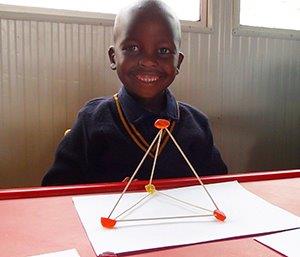Latest News Archive
Please select Category, Year, and then Month to display items
17 June 2020
|
Story Dr WP Wahl

The Division of Student Affairs (DSA) prioritises innovation to meet the challenges of food insecurity and malnutrition among students. To this end, several student volunteers and student governance structures are collaborating with the DSA on various initiatives.
During 2019, various conversations were held about the possibility of creating a health-promoting food environment at the UFS where students and staff are well informed and empowered to take appropriate action regarding their food and nutritional needs. These conversations resulted in an institutional strategy to address the food environment at the UFS. Student representatives serve on a technical committee that directs the implementation of this strategy. In this regard, several initiatives have already been launched.
Students from residences and other student communities have planted vegetable gardens on the Bloemfontein Campus with the assistance of KovsieACT and the Faculty of Natural and Agricultural Sciences. Students and staff are already harvesting and distributing vegetables to needy students every week. Measurements were put in place to continue this during the COVID-19 period. The following vegetables were planted: spinach, cabbage, beetroot, broccoli, cauliflower, and carrots.
Food parcels, donated by Tiger Brands and Gift of the Givers, are continuously handed out by DSA staff and student volunteers. In this regard, 540 food parcels have already been handed out on the Bloemfontein Campus during the COVID-19 period alone. During the same time, 117 students received food parcels on the Qwaqwa Campus. The innovation of this food parcel project rests on the fact that business, NPOs, UFS students, and DSA staff are collaborating to address food insecurity and malnutrition.
More collaborative initiatives will be implemented over the next 12 months. The DSA staff and students are already working with the Department of Dietetics and Consumer Sciences to create information packages about the preparation of low-budget nutritious meals.
Related article:
Vegetable tunnels established to continue the fight against food insecurity
Science 4Fun, collaboration between CUT and UFS community engagement
2017-08-16

For Grade R learners at Nzame Primary, their
basic Geometry insight about shapes advanced
to engineering skills when they built modern pyramids,
connecting jelly sweets and sosatie sticks.
Photo: Supplied
Any phase in a learner’s life can be the right time to explore science. As for Grade R learners at Nzame Primary School in Mangaung, it all started when their Deputy Principal, Charles Busack, attended the Global University for Lifelong Learning (GULL) workshop coordinated by the university’s Community Engagement in October 2016. The GULL network enables its affiliated organisations to recognise the individual and collective efforts of those who are creating progressive transformation in communities and in the workplace. Consequently, a community-based initiative, Science4Fun, was developed and launched at the primary school, where learners would start to experiment with science through play.
University students instrumental in teaching
Every Tuesday morning, these fun science activities form part of the foundation phase programme, in which Dr Elizabeth Conradie of the Central University of Technology (CUT) and four postgraduate Science students from the UFS, engage teachers and learners in exciting experiments and demonstrations.
Most people just know pyramids as big, impressive structures built a long time ago in Ancient Egypt. However, for Grade R learners at Nzame Primary, their basic Geometry insight about shapes advanced to engineering skills when they built modern pyramids, connecting jelly sweets and sosatie sticks.
Laying a foundation for the future
According to Dr Conradie, more fun exercises are lined up for curious minds, exploring other sciences such as Chemistry and Mathematics, combined with music. The initiative will assist to equip learners with the basics of Science into more advance learning phases of the schooling years, giving them an advantage.